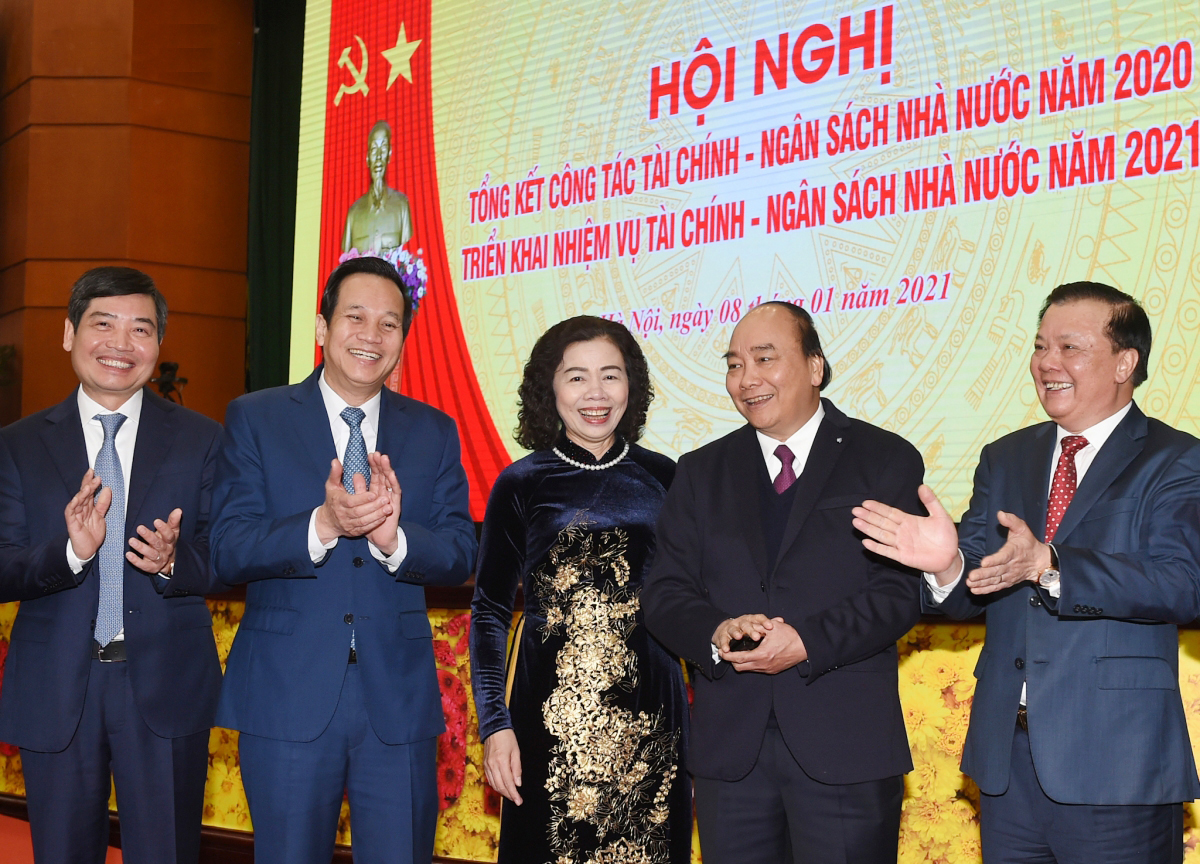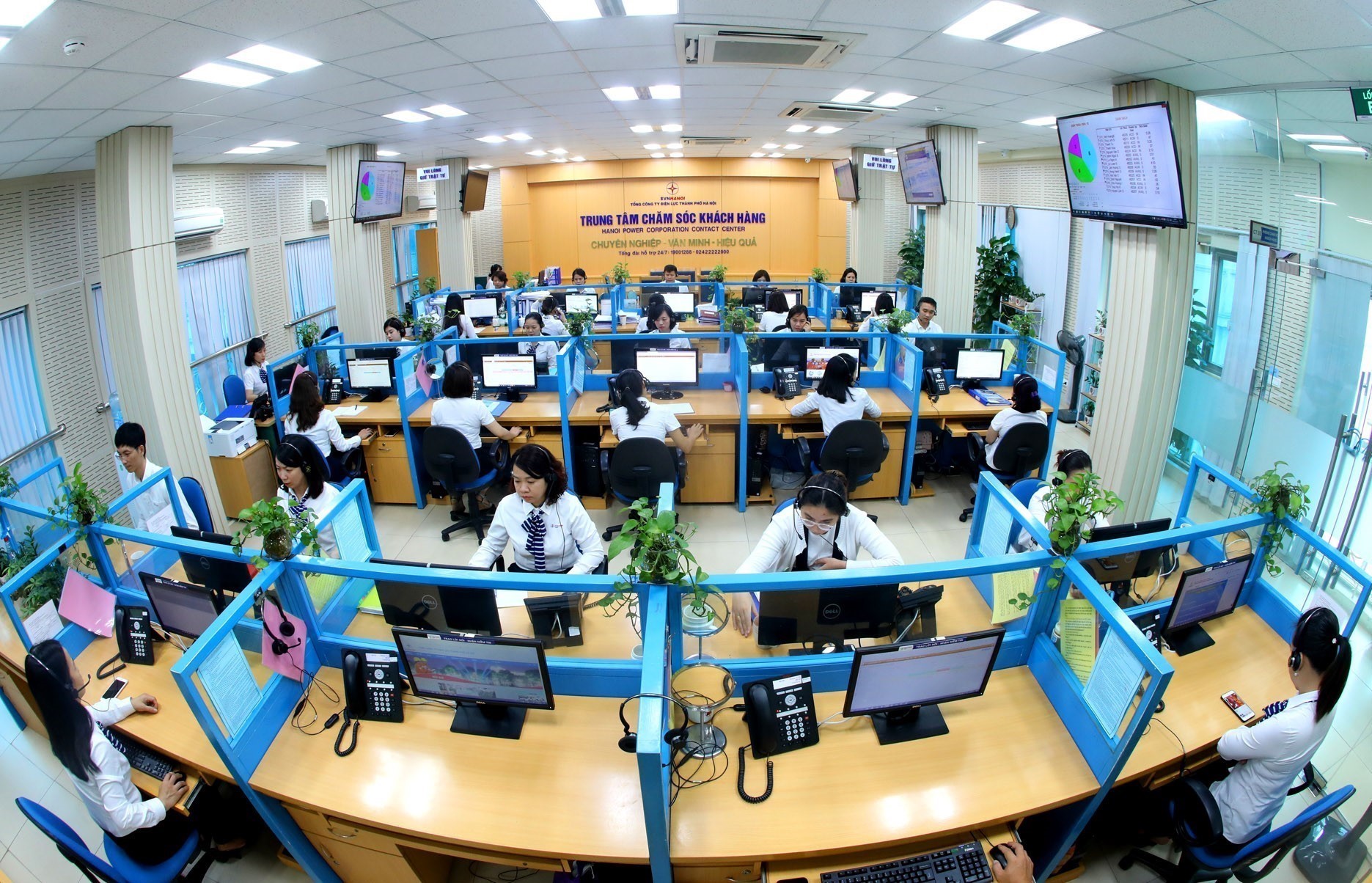Vietnam continues implementing the proactive, disciplined and effective fiscal policy to achieve socio-economic development goals and ensure national security and defense in 2021
Communist Review - Overcoming many difficulties and challenges, in 2020, Vietnam's financial industry closely followed the guidelines and resolutions of the Communist Party, the National Assembly and the Government of the Socialist Republic of Vietnam, and achieved positive results in many fields. In 2021 and the following years, the industry will continue conducting the proactive, disciplined and effective fiscal policy, thereby it is determined to both restore economic growth and control the epidemic domestically by making the most of the advantages in order to achieve the socio-economic development goals set out by the 13th National Congress of the Communist Party of Vietnam.

Politburo Member of the Party’s Central Committee, Prime Minister of the Socialist Republic of Vietnam Nguyen Xuan Phuc with delegates attending the online conference on state budget and financial affairs of 2020 and state budget-financial plans for 2021 (Hanoi, January 8, 2021) _Photo: VNA
Proactively, flexibly, and promptly removing difficulties in 2020
The tasks of socio-economic development and state budget - finance in 2020 were performed in the context that the world and domestic economies were seriously affected by the COVID-19 pandemic and climate change.
Facing that situation, on the basis of the direction of the Communist Party, the National Assembly and the Government of the Socialist Republic of Vietnam, the fiscal policy has been proactively, flexibly and promptly managed with the solutions to remove difficulties for production, business activities, enterprises and people affected by COVID-19, ensure funding for epidemic prevention and control, and handle consequences of natural disasters as droughts, storms and floods,... Specifically:
Regarding state budget revenue, 30% of corporate income tax and 30% of environmental protection tax for jet fuel were reduced; land rent was decreased; payment of value added tax, corporate income tax, personal income tax and land rentwas extended; payment of excise tax on domestically manufactured and assembled cars got extension, agricultural land use tax continued obtaining exemption and dozens of fees and charges for people and businesses were also exempted or reduced…
The results of the implementation of policies by the end of November 2020 reached about 103.2 trillion VND, of which: extension of tax payment and land rent wasabout 67.2 trillion VND; extension of the excise tax on domestically manufactured and assembled cars about 16.5 trillion VND; exemption or reduction of taxes, fees and charges about 19.5 trillion VND.
Regarding state budget expenditure, despite decreasing budget revenue and difficult budget balance, spending on preventing and controlling epidemic, supporting people affected by the COVID-19 pandemic, and overcoming consequences of natural disasters as droughts, storms and floods still increased .
By the end of November 2020, the budget has been spent with more than 17.9 trillion VND on epidemic prevention and control, supporting over 12.95 million people, more than 30.3 thousand business households affected by COVID-19; the Government has spent more than 4.54 trillion VND in budget reserve to overcome the consequences of natural disasters and African swine fever. In addition, about 32.95 thousand tons of rice from the national reserve was distributed to help alleviate hunger for the people in order to overcome the consequences of natural disasters and the between-crop period at the beginning of the year.
To share difficulties with businesses and people, ministries, central and local agencies were asked to thoroughly save state budget expenditures, review and cut at least 70% of conference costs and travel expenses at home and abroad, save an extra 10% of regular spending, stop spending for some non - implemented tasks...
Because of the serious impacts of the COVID-19 pandemic and the implementation of fiscal policy solutions to support businesses and people, the state budget balance in2020 had difficulties. Accumulated state budget revenue in 11 months of 2020 reached 83.4% of the estimate, down 7.8% over the same period in 2019, the lowest level in recent years, in which the central budget revenue in 2020 reached 88.4% of the estimate.
However, thanks to the positive results from the epidemic prevention and control, the spillover effects from the Government's financial and monetary support solutions, the production and business situation in the last months of the year has started to improve, consumer confidence has been strengthened, thereby contributing to increasing the budget revenue. It is estimated that for the whole year, the state budget revenue will reach about 1.44 million billion VND, equal to 95% - 96% of the estimate.
Although budget revenue declined, thanks to the proactive management and accumulated fiscal space in the period 2016 - 2019, on the basis of effective implementation of Resolution No. 07-NQ/TW, dated November 18, 2016 of the Politburo of the Central Committee of the Communist Party of Vietnamon policies and solutions to restructure the state budget and manage public debt to ensure a safe and sustainable national finance, balancing central and local budgets in 2020 still ensured the accomplishment of important political, socio-economic tasks with the efficient and effective use of allocated budget. At the last session of 2020, the Government reported and asked the National Assembly to adjust the overspending to 4.99% of GDP. However, thanks to the better budget revenue and thoroughly saving and cutting expenses, thebudget deficit may be only about 4.1% - 4.2% of GDP.

In 2020, the tax industry implemented solutions to help remove difficulties for production, business, enterprises and people affected by COVID-19, such as extending the excise tax on domestically manufactured and assembled cars... (In the photo: Hyundai Thanh Cong's car production line in Vietnam) _Photo: VNA
Adhering to the guidelines and resolutions of the Communist Party, National Assembly and Government of Vietnam throughout the tenure
Looking back over the past 5 years, Vietnam's fiscal policy was closely and flexibly managed, closely followed the guidelines and resolutions of the Communist Party, the National Assembly and the Government; thereby, many positive results were achieved. For example, budget revenue mobilization reached 24% - 25% of GDP (beyond the plan of 23.5% of GDP); revenue structure has changed positively, the proportion of domestic revenue increased from 68% in the period 2011 - 2015 to about 85% in 2020; the estimated proportion of development investment spending increased from 26.2% of the 2018 estimate to 26.9% of the 2020 estimate, achieving an estimate of over 28% (beyond the target of 25% - 26%); the proportion of recurrent expenditure decreased from 61.8% of the 2018 estimate to 60.5% of the 2020 estimate; the average overspending in the five years from 2016 to 2020 was less than 3.9% of GDP, thus accomplishing the goal for this period; public debt was reduced, falling from 63.7% of GDP in 2016 to about 55% - 56% of GDP in 2020. Thus, this contributed to stabilizing the macro-economy, removing difficulties for businesses, attracting new investment flows, promoting economic restructuring, strongly improving transport infrastructure, irrigation, investment in agriculture and rural areas as well as increasing the social insurance coverage. The socio-economic situation in the country changed positively and comprehensively in many aspects, and the national prestige and credibility of Vietnam in the international arena was consequently enhanced.
Promoting advantages, maintaining the dual goal
Entering 2021, in the context that the world economy recovery relies heavily on the ability to control the COVID-19 pandemic, and complicated factors in economic and political relations between countries and regions, but with the determination to continue maintaining the dual goal of both recovering economic growth and controlling the domestic epidemic, maximizing basic advantages, such as stable political situation, improved business environment, new opportunities from new-generation free trade agreements, towards thesuccessful implementation of the goals and orientations for socio-economic development, the 13th Party National Congress has set state budget - finance targets in the coming years which aim at “Mobilizing, allocating and effectively using the State's resources to stabilize macro economy, promote economic recovery, ensure social security, national security; implementing the restructuring of the state budget in association with reorganizing the apparatus, personel downsizing, renovating the public non-business sector; tightening budgetary-financial discipline and thoroughly saving state budget expenditures”.
To achieve the above goals, Vietnam's financial industry is facing great pressure, requiring focus on solving the following issues in the coming time: balancing the state budget is still difficult; expenditure structure in some sectors and fields is not really reasonable; government debt obligations tend to increase; equitization of state-owned enterprises remains slow; financial autonomy of public non-business units in some fields has not yet achieved the set targets...
Therefore, in order to continue promoting the obtained achievements and focus on tackling difficulties and challenges, the financial industry needs to perform the main tasks and solutions as follows:
Firstly, regarding state budget revenue, continue perfecting the institutional system and budget revenue policy, creating a favorable, transparent and fair investment and business environment; consider maintaining policies of exemption, relief and relaxation of taxes, fees and charges to support businesses to overcome difficulties caused by the COVID-19 pandemic; in addition, strengthen the management of revenue, fight against loss of revenue, ensure the correct, sufficient and prompt collection of taxes, fees, charges and other revenues into the state budget; promptly detecte and strictly punish acts of smuggling, commercial fraud, production and trading of fake goods, transfer pricing, tax evasion, tax fraud, and taking advantage of tax refund policies. Strive to collect about 3% more than the estimate assigned by the National Assembly and the Prime Minister.
Secondly, regarding state budget expenditure, allocate resources for socio-economic development, national security and defense, and important political tasks, such as the 13th National Congress, the 15th National Assembly election, national target programs in the new phase, especially the national target program for socio-economic development in ethnic minority and mountainous areas in the 2021-2030 period,... Strictly manage expenditures right from the costs estimating to spending; eliminate unnecessary expenses, minimizing expenses forconferences, seminars, business trips at home and abroad, expenses for purchasing expensive equipment; prioritize resources for implementation of social security policies, ensuring national security and defense tasks and essential services.

State budget expenditure ensuring resources for national target programs in the new phase, especially the national target program for socio-economic development in ethnic minority and mountainous areas in the 2021 - 2030 period _Photo: Archives
Reviewing obstacles to speed up disbursement of public investment capital, especially for national key projects with great spillover effects, connectivity and driving force for inter-regional socio-economic development. The formulation, allocation of capital and spending plans must base on the faesibility of each capital source, each project and each ministry or each locality. Strictly managing, avoiding loss and waste, improving the efficiency of public investment.
Strictly following up state budgetary-financial discipline, enhancing inspection, supervision and ensuring the budget publicity and transparency, especially in sectors vulnerable to corruption and wastefulness. Strictly reviewing and managing the moving budget in accordance with the provisions of law.
Thirdly, strictly managing and controlling public debt, continuing restructuring state budget loans in order to minimize risks of maturity date, exchange rate and interest rate; minimizing Government guarantees; closely supervising the lending and use of capital of off-budget financing; improving the efficiency of loan use, focusing on key projects, ensuring debt repayment. Striving to reduce the public debt to the safety limit allowed by the 10th session of the XIV tenure of the National Assembly.
Fourthly, continuing improving the institution, legal framework on restructuring, equitization, divestment of state-owned enterprises, management and use of revenues from divestment of state capital in enterprises; reviewing and accelerating the progress of equitization and divestment of state capital in enterprises to ensure strict compliance with the provisions of law; strengthening inspection, supervision and audit, preventing loss of state capital and assets in the process of restructuring, equitization, management and use of state capital.
Fifthly, perfecting the regulations on the autonomy mechanism of public non-business units; completing the planning of public non-business network; completing the list of public non-business services using the state budget, economic and technical norms... as a basis for building and speeding up the roadmap to adjust appropriately the price of public administrative services in accordance with the requirements of improving autonomy, enhancing the quality and operational efficiency of public non-business units and support mechanisms to ensure that the poor and the privileged have access to basic public services. Strengthening the mechanism of allocating financial resourcesfor the provision of public goods and services through bidding, ordering. Building a roadmap to promote the bidding and ordering mechanism in line with the roadmap for adjusting public service prices and the ability to balance the state budget.
Sixthly, strengthening the management, distribution, exploitation and effective use of public property by perfecting institutions and policies, developing a comprehensive legal framework and ensuring the synchronization with relevant legal documents in the management, supervision, exploitation and use ofpublic property.

Vietnam has stepped up administrative reform in association with reorganization of apparatus, reform of administrative procedures and modernization of technology, especially in the areas related to people and businesses _Photo: VNA
Seventhly, promoting administrative reform in association with reorganizing the apparatus, reforming procedures and modernizing technology, especially in areas related to people and businesses, such as taxation, customs, state treasury, insurance management, contributing to strongly improving the business environment, the competitiveness of the economy, increasing the effectiveness and efficiency of state management. Strengthening publicity, transparency, enhancing the community supervision on the state budget-finance in accordance with the provisions of the Law on State Budget.
Eighthly, managing price based on market principles, promoting fair competition among economic sectors, improving resource use efficiency, stabilizing major balances, and supporting growth. Applying a market mechanism under the State's management for important commodities, ensuring harmony between the legitimate interests of consumers, businesses and the State. Taking strict control of pricing combined with taxes to prevent and handle unreasonable price hikes, trade frauds, speculation and market manipulation.
Ninthly, continuing developing synchronously and smoothly operate the financial market and financial services. Fostering the bond market, including the corporate bond market, along with diversifying and improving product quality on the stock market. Encouraging the development and improvement of the quality of insurance products. Accelerating network expansion and diversifying insurance distribution channels in addition to traditional distribution channels. Strengthening the connection of insurance products with other financial services.
Finally, strictly implementing state budgetary-financial discipline, enhancing inspection, control, supervision and publicity and transparency in state budget; striving to save budget spending and combat against wastefulness./.
This article was published in the Communist Review No. 959 (February 2021)